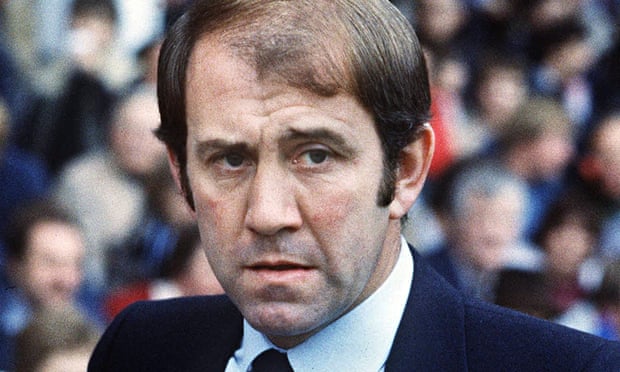OBITUARY: Howard Kendall
Sunday 18 October 2015
Howard Kendall, who has died aged 69, once likened his association with Everton Football Club to a marriage rather than a love affair. It was a marriage that lasted, albeit with separations, for more than 30 years, and brought him three league titles – one as a player, two as manager – as well as the sweet satisfaction, in 1985, of turning a club overshadowed by the presence of Liverpool into the outstanding English team of the mid-1980s.
That 1984-85 title-winning season, when they finished 13 points clear of their Merseyside rivals, culminated in Everton’s finest night, with a 3-1 victory over Rapid Vienna in the final of the European Cup-Winners’ Cup. But that was also the year disfigured by the lethal skirmishes on the terraces of the Heysel stadium in Belgium before the start of Liverpool v Juventus in the European Cup final. In the aftermath, English clubs were banned from European football for five years, and in spite of a second league title in 1986-87 Kendall and his wonderful Evertonside never did get their chance to dominate Europe.
Kendall was born in Ryton, County Durham (now Tyne and Wear), joined Preston North End in 1961 as an apprentice and, in 1964, aged 17 years and 345 days, became the youngest ever player to feature in a Wembley final, in the FA Cup decider against West Ham. Back then he was a defender, but in 1967 he moved to Goodison Park and into a midfield combination with Alan Ball and Colin Harvey that drove Everton to the league title in the 1969-70 season.
Ten years and three clubs later, he began his managerial career with Blackburn by taking them back to the Second Division in his first and only season with them before heading back to Everton. A progressive manager who disdained the long-ball style of play that was blighting the English game, Kendall was to build a sophisticated team that could pass fluently and accurately. From unpromising beginnings – at one stage six wins in 21 league games prompted him to offer his resignation – he put together a dazzling side, trawling smaller clubs for talent that included Peter Reid, Trevor Steven and the goalkeeper Neville Southall, while bringing in bigger-money signings such as Adrian Heath, who in January 1984 probably kept Kendall in his job in his third season at Goodison when he scored in a League Cup tie against Oxford United. Everton went on to contest the final, inevitably losing to Liverpool. But that season ended with victory over Watford in the FA Cup.
Up front was Andy Gray, a striker revered for his willingness to put his head where other players were reluctant to put their boots. He was signed in late 1983, and his goals turned Everton’s fortunes around. After Gray moved on to Aston Villa, Kendall brought in the even more prolific Gary Lineker, who has described Everton as “the best club team I played for”. But after two league titles in three seasons, and feeling thwarted by Europe’s ban on English clubs, Kendall left in 1987 to manage Athletic Bilbao in Spain. More frustration followed due to the Basque club’s proscription on signing non-Basque players, and at the end of 1989 Kendall was back in England, with Manchester City.
FacebookTwitterPinterest Howard Kendall playing for Stoke City in 1978. Photograph: Colorsport/Rex Shutterstock
As a personality, Kendall could be described as convivial. When Bobby Robson was offloaded as England manager after the 1990 World Cup, Kendall was shortlisted for the role by the Football Association but declined to be interviewed, because he did not fancy the loneliness of the job. Instead, he ditched Manchester City and went home to Goodison Park.
“It was never a secret that Howard liked a drink,” said the journalist James Mossop, then of the Sunday Express, “so one interview started at the Everton training ground, moved to a nearby pub/steak house where the ale and wine came by the flagon, the world was put to rights and we concluded the interview back in the training ground sauna because Everton had a match that night
“On another occasion, after a run of poor results, Howard decided the squad should meet for a bonding session in Chinatown on the next Tuesday. It went so well that some of the players were there until it was almost dinner time. The team won the next match and the next and the next and everyone agreed that the Tuesday gatherings had been crucial and the same wild lunches should happen every week. Then they lost and Howard gathered the players together and said: ‘Right, lads, this Tuesday routine is clearly not working any more. How do you feel about Wednesdays?’”
When Kendall returned in 1990, Everton were flailing around in the lower reaches of the First Division; he duly saved their season by taking them to a mid-table finish and an FA Cup run that ended in the quarter-finals. Hopes rose and sank; mid-table was where they stayed. His resignation in December 1993 was followed by spells managing a Greek club, Xanthi, Notts County and Sheffield United before his final return to Everton. That lasted only a season, and a short stint in Greece managing Ethnikos Piraeus was his last job in football management.
He is survived by his wife, Lil, daughters, Hailey and Lisa, and son, Simon.
• Howard Kendall, football player and manager, born 22 May 1946; died 17 October 2015



Commenti
Posta un commento